- Home
- Nick Carter
Six Bloody Summer Days Page 3
Six Bloody Summer Days Read online
Page 3
So would Hawk. I sent him a coded cable addressed to Mrs. Helen Cole at a D.C. address. In it I asked for all background on ownership and control of North African Airlines. I also mentioned that it appeared my cover had been blown. Then I retired to the airport restaurant for some fairly good cataloni and a fiaschi of Bardolino. Only my waiter paid any attention to me.
It was ten minutes to one when I returned to the boarding area. Passengers were already being checked through, the mechanical problem had been solved. The two Britishers, more red in the face but none the worse for the delay, were jawing at each other as a tough-looking Arab with a red fez frisked them for weaponry.
My own clearance was routine. None of the three male attendants gave me more of a checking over than anyone else. I went on through the gate and down the ramp into the afternoon sunlight, making it a point to put myself in the midst of the flow of passengers. I didn't think anyone was going to take a shot at me from this vantage point, but then I hadn't expected a reception committee, either.
The interior of the Caravelle was narrow and the double seats on each side of the aisle were built for payload not comfort. There was Utile room for hand luggage, and the overhead racks, which were meant only for coats and hats, were crammed with all manner of goods. The two stewardesses, in short-skirted navy blue uniforms, didn't try to enforce the rules, knowing it was useless. The paint was peeling, as was the beige decor beside my head. I hoped the aircraft maintenance was a bit more professional. I had chosen a seat at the rear. That way I could check new arrivals and not have my back to anyone.
At 1320 there were no more passengers boarding. Most of the seats were occupied. Still, the tail ramp remained down and the pilot had not switched on his generators. Arabic Muzak was entertaining us. It didn't seem likely that we were waiting for another announcement of mechanical delay. We weren't. We were waiting for the arrival of the last passenger.
He came with a huff and a puff, stumbling heavily up the steps, the taller of the two stewardesses waiting to receive him.
I heard him wheezing in French, "Hurry, hurry, hurry. Everything is hurry… And I am always late!" Then he saw the stewardess and switched to Arabic, "As salam alikum, binti."
"Wa alikum as salam, abui," she replied, smiling, reaching to give him a hand. And then in French, "There is no rush, Doctor."
"Ahhh, you tell that to your reservation desk!" He was loaded down with a plastic bag full of wine bottles and a battered, over-sized attaché case.
The stewardess clucked over him, relieving him of his goods while he panted and protested at the unnaturalness of departure times. His taxi had been caught in the damnable Rome traffic. The least the FAO could have done was to supply him with a car, etc., etc.
The doctor was a big man with heavy features. He had a pelt of curly, close-cropped gray hair. That, along with his taffy-hued skin, indicated a degree of black ancestry. His dark blue eyes supplied an interesting contrast. As the stewardess stowed his possessions, he thumped down in the seat beside me, wiping his face with a handkerchief and apologizing while catching his breath.
I spoke to him in English as the tail ladder rose and locked into place. "Kind of a tough race, hey?"
Now he looked at me with interest. "Ahh, English," he said.
"Several times removed. American."
He threw his meaty hands wide, "American!" It sounded as though he'd made an exciting discovery. "Well, welcome! Welcome!" He extended his hand. "I am Doctor Otto van der Meer of the U.N. Food and Agricultural Organization." He accent was more French than Dutch.
"Your seat belt, Doctor," said the stewardess.
"What? What!" He had a booming voice, and I noticed several of the passengers look back and either smile or wave to him.
The belt secure over his bulging middle, he turned his attention to me again as the Caravelle moved away from its pad and began to taxi. "So — an American. RAPCO?"
"No, I'm a journalist. My name is Cole."
"Ahh, a journalist, I see. How do you do, Mr. Cole, a pleasure." His handshake indicated that beneath the girth lay something more solid. "Who are you with, The New York Times?"
"No. AP and WS."
"Oh, yes, yes. Very good." He didn't know AP & WS from AT & T, nor did he care. "I suppose you are coming to Lamana because of the Prime Minister's death."
"That's what my editor suggested."
"A terrible thing. I was here in Rome when I heard."
He wagged his head. "A sad shock."
"You knew him well?"
"Oh yes, of course."
"Do you mind if I combine business with pleasure and ask you some questions about him?"
He blinked at me. His forehead was broad and long, which gave an odd foreshortened cast to the lower part of his face. "No, no, not at all. Ask me what you like, and I'll tell you all I can."
I brought out my notebook, and for the next hour it was Q and A. I filled a lot of pages with information I already had.
The doctor was of the popular opinion that even if Mendanike's death had been accidental, which he doubted, a colonel's coup was somewhere in the making.
"The colonel being General Tasahmed?"
He shrugged. "He would be the most obvious choice."
"But where's the coup in it? Mendanike's gone. Wouldn't the succession go to the general anyway?"
"There could be a colonel in it. Colonel Mohammed Doosa is chief of security. It is said that he has modeled his organization along the lines of the Egyptian Mukhabarat."
Which had been modeled, with the aid of Soviet advisors, along the lines of the KGB. I had read about Doosa in my briefing papers. They indicated he was Tasahmed's man. "What can he do if the army belongs to Tasahmed?"
"The army is not the Mukhabarat," he muttered. Then he sighed, folding his meaty arms on his chest, staring at the back of the seat in front of him. "You must understand something, Mr. Cole. I have spent most of my life in Africa. I have seen this sort of thing before. But I am an international civil servant. Politics do not interest me, they disgust me. A pack of jackals fighting to see who can be top jackal. Mendanike may have seemed a windbag to the outside, but he was no fool in his homeland. He took care of his people as best he could, and it is difficult to say what the outcome will be now that he is gone, but if things run true to form it will be bloody."
The doctor had become long in the tooth and obscure in meaning. "Are you saying Doosa is getting outside help?"
"Well, I am not wishing to be quoted, but in the capacity of my work I must travel the country much, and I am not blind."
"You mean Abu Osman fits into it?"
"Osman!" He looked at me, eyes wide. "Osman is a reactionary old fool running around in the sand calling for a holy war like a camel bawling for water. No, no, this is something else."
"I'm not going to play guessing games, Doctor."
"Look, I am talking too much already. You are a nice American journalist, but I don't really know you. I don't know what you will do with my words."
"I'm listening, not quoting. This is a backgrounder. Whatever you have in mind I would have to check out anyway."
"One thing I have in mind, Mr. Cole, is that you may have trouble checking on anything. You may not even be permitted to enter the country." He was becoming slightly truculent.
"That's the chance any newsman has to take when his editor says, go."
"Old. I'm sure it is. But there will be no friendliness to any Americans right now, particularly to one asking questions."
"Well, if I'm going to have the dubious distinction of being thrown out of the place before I get into it, I'll try to speak softly," I said. "You know, of course, about our Ambassador's death?"
"Certainly, but that means nothing to the people. They are only thinking about the death of their leader. You see a connection between the two? Well" — he took a deep breath and let out a sigh, a man making a reluctant decision — " look, I will say one more thing, and then that is enough of this interviewi
ng. In the last months there have been some people coming into the country. I know their look from having seen them in other places. Guerrillas, mercenaries, commandos — what you will — a few coming in at a time, not staying in Lamana, going off into the country. I see them in the villages. Why should such people come to this place? I ask myself. There is nothing here. Who is paying them? Not Mendanike. So maybe they are tourists on holiday, sitting in the coffee shops, admiring the view. You figure it out, Mr. Newspaperman. Fini." He put period to it, spreading his hands. "Now, you will excuse me. I need to rest." He put his head and seat back and went to sleep.
His position had been that of a man wanting to talk but reluctant to do so, becoming more reluctant as he proceeded, until he had reached the point of being upset and disgruntled at his frankness with an unknown journalist. Either he talked too much or he was a good actor.
In any case, there was no need to tell me about the influx if he didn't think it was so. Commando types had stolen the nuke, and although the Middle East from Casablanca to South Yemen was full of them, it could be a lead.
When the good doctor awoke from his snooze he was in a better frame of mind. We still had about an hour to go, and I encouraged him to talk about his agricultural projects. He had spent most of his life in Africa. He had a Belgian father — not Dutch — and had gone to the University of Louvain, but after that his life had been dedicated to the food problems of the Dark Continent.
As the pilot began his descent, van der Meer switched from telling me about the world catastrophe of spreading drought to fastening his seat belt. "Ecoutez, my friend," he said, "customs here is never easy. For you at this time it can be made very difficult. You stay with me. I will make you an FAO writer, how is that?"
"I wouldn't want to get you in trouble."
He snorted. "No trouble for me. They know me well enough."
It sounded like an opportunity. If it was something else, I'd find out why. "I appreciate the offer" I said. "I'll tag along behind."
"I suppose you don't speak Arabic?"
There's always an advantage in playing dumb to the language of a hostile land. "It's not one of my talents," I said.
"Hmmm." He nodded pontifically. "What about French?"
"Un peu."
"Well, use it as best you can if you are questioned, and you will be questioned." He rolled his eyes.
"I'll try," I said, wondering if in my cover as a journalist I could write an article on why the "liberated" elite of former French possessions prefer speaking French as a status symbol, rather than their own native tongue.
Chapter 4
The city of Lamana sits on the edge of an ancient half-moon harbor, old before the Romans threw out the Carthaginians. We flew over it and the dusty metropolis below. It hadn't grown much since my last stop through.
"Have you been here before?" the doctor asked.
"I expected Lamana to be larger." I said in the way of implying I hadn't.
"It would have to have a reason to grow. The Roman ruins at Portarious were once a tourist attraction. Maybe if we discover oil, who knows."
Lamana's airport terminal was the typical square yellowish building with adjoining wings. Set apart from it was a single large hanger with a high arching roof. Aside from our aircraft, no other planes were on the flight line. What was on the flight line was a platoon of infantry, sporting blue and white checked kefiyas for headgear. They were equipped with Belgian FN 7.65 submachine guns and backed up by a half-dozen conveniently placed French Panhard AML combat cars.
A squad of the platoon was strung out along the sun baked tarmac. We marched past them, heading for the custom's wing of the terminal. One stewardess led the parade, the other brought up the rear. In helping the doctor with his overload, I noted the squad had a sloppy look, no spit and polish, just sullen stares.
"I don't like it," the doctor muttered. "Maybe the coup already."
The Douane — "Customs" — in any third or fourth world state, is a drawn-out affair. It is one way of getting even. It also cuts down on the unemployment. Give a man a uniform, tell him he's boss, and you don't have to pay him much to keep him on the job. But here, two new factors had been added — outrage at the loss of the leader, and uncertainty. The result was tension and a sense of fear among the new arrivals. I could smell it in the stinking airless barn which served the purpose of greeting the returnee.
The line moved with predetermined slowness, the traveler having to present debarcation carte, passport, and immunization record at separate stations manned by inspectors eager to cause trouble and delay. Up ahead, voices were raised in anger between the three Frenchmen and examining officials. The trio from Paris were not having any; they were wise to the game.
When it was van der Meer's turn, he greeted the officer at the counter in Arabic — a long-lost brother. The brother grunted noncommital replies and did his stamping with a heavy hand.
As I stepped up to the counter, the doctor switched to French for my benefit. "This man is a friend. He has come from Rome to write about the experimental farms."
The official, thick-necked and square-faced, waved the doctor on and concentrated on my papers. When he saw the passport his head snapped up, and he stared at me with angry satisfaction. "American!" he spit it out in English, a dirty word. And then he snarled in Arabic, "Why have you come here?"
"C'est dommage, M'sieu. Je ne comprend pas," I said, holding his mud-stained eyes with my own.
"Raison! Raison!" he shouted, drawing attention. "Porquoi êtes-vous ici?" And then in Arabic, "Son of a dung eater."
"As your famous Doctor van der Meer has said," I stuck to the French, "I am here to report on the progress you have made, turning the desert into productive land. It is the kind of good news that should be reported everywhere. Don't you agree, M'sieu Major?"
That backed him off a bit. Raising his rank from under-lieutenant didn't hurt. It brought a grunt.
"It is a thing you can be proud of." I brought out my cigarette case and offered him one. "You are fortunate to have such a man as the doctor." I smiled at van der Meer who was in line at the next counter, looking worriedly over his shoulder at us.
The newly ranked major grunted again, taking the cigarette, impressed with the gold initials. I held the lighter. "How long do you plan to stay here?" he growled, studying my AXE-forged visa.
"A week, in-shallah."
"No, not as Allah wills but as Mustafa wills." He exhaled a cloud of smoke pointing at himself.
"If you like, I'll put you in the article I'm going to write. Major Mustafa who welcomed me and made it possible for me to tell others of the great things you are doing here." I gave it the grand gesture.
If he was aware that this was a put-on he realized he'd better not show it. I was speaking loudly enough so that all the other inspectors could hear me. Arabs have a dry sense of humor. They like nothing better than to see a loud-mouth in their midst made fun of. I sensed that some at least were not keen on Mustafa.
Actually, he was much easier to play than the trout. Once past him, the checking and stamping became more routine. The luggage search was thorough, but not thorough enough to disturb Wilhelmina and Hugo. I only heard myself referred to twice as a "filthy American spy." By the time the white chalk mark of clearance was awarded my attaché case and bag, I was feeling right at home.
Van der Meer had waited for me, and as we departed the sweltering shed, the two Britishers, who spoke neither French nor Arabic, were making the welkin ring with Mustafa.
The bearer dumped our luggage in a vintage Chevy's trunk. The doctor handed out the baksheesh, and with many blessings from Allah we climbed aboard.
"You are staying at the Lamana Palace?" My host was perspiring heavily.
"Yes."
I took in the scene. The terminal looked more humane from the front. There was a circular drive with an arm jutting off for hanger traffic and a gravel road leading out across the jebel toward a mirage of lakes. In the heat haze to the so
uth the broken hills were higher, wind-blasted, sun-scorched. The hard blue sky was a merciless radiator.
"You will not find it lives up to its name… palace." The doctor sighed, sitting back after giving the driver instructions. "But it's the best Lamana can offer."
"I want to thank you for your help in there." I, too, was sitting back as the driver tried to put the accelerator through the floor before he had completed the turn on to exit road.
The doctor was having none of it. "Slow down, you sixth son of a camel driver!" He bellowed in Arabic. "Slow down, or I'll report you to security!"
The driver threw a surprised glance in the mirror, lifted his foot, and went into a sulk.
"Ahh, it is too much." Van der Meer mopped his face with his handkerchief. "All so foolish, such a waste. I compliment you on the manner in which you handled yourself. Your French was good."
"It could have been worse. They might have taken my passport."
"They'll take it at the hotel, and God knows when you'll get it back."
"You know, maybe I will come out and do an article on your work. Where can I find you?"
"I would be honored." He sounded like he meant it. "If I were staying in the city I would invite you to be my guest. But I must go to Pakar. We have a station there where we are growing soybeans and cotton. I should be back tomorrow. Why don't you take my card? If you are still here, call on me. I will take you to the main area of our work, and you can ask me what you like."
"If I'm not in jail or haven't been thrown out, we'll give it a try, doctor. Do you think there's been a coup already?"
Van der Meer spoke to the driver, "Is all quiet in the city?"
"Soldiers and tanks, but all quiet."
"Wait until they have the funeral. If I were you, Mr. Cole, I'd stay off the street at that time. As a matter of fact, why don't you come with me now? Until things quiet down."

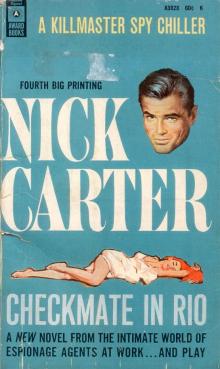 Checkmate in Rio
Checkmate in Rio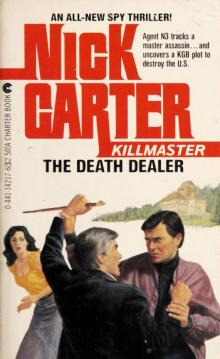 The Death Dealer
The Death Dealer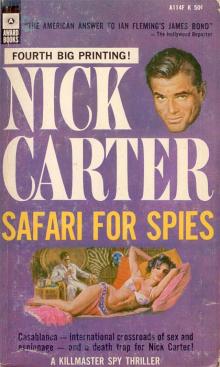 Safari for Spies
Safari for Spies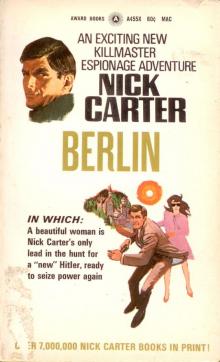 Berlin
Berlin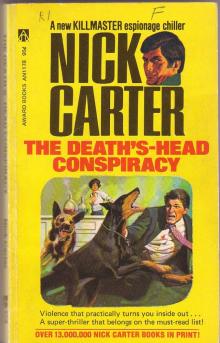 The Death’s Head Conspiracy
The Death’s Head Conspiracy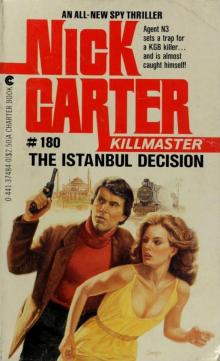 The Istanbul Decision
The Istanbul Decision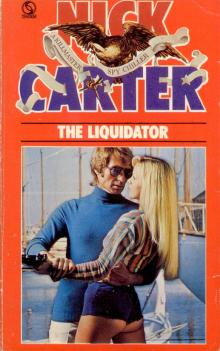 The Liquidator
The Liquidator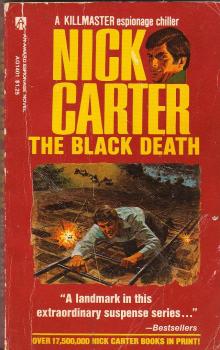 The Black Death
The Black Death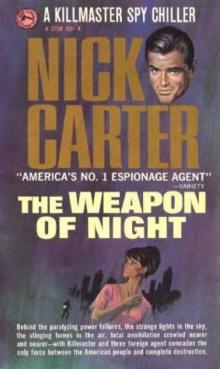 The Weapon of Night
The Weapon of Night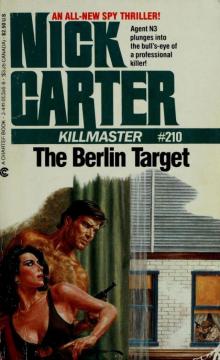 The Berlin Target
The Berlin Target Temple of Fear
Temple of Fear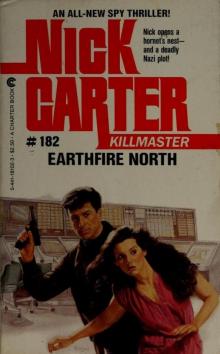 Earthfire North
Earthfire North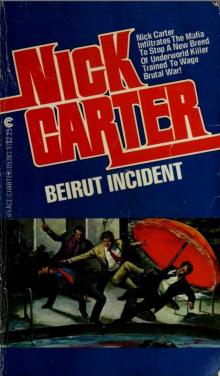 Beirut Incident
Beirut Incident White Death
White Death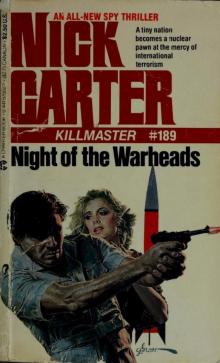 Night of the Warheads
Night of the Warheads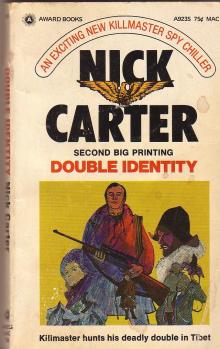 Double Identity
Double Identity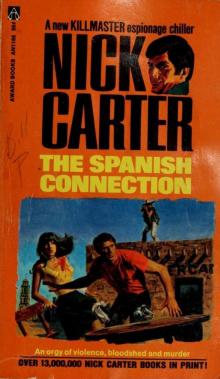 The Spanish Connection
The Spanish Connection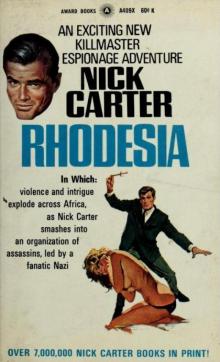 Rhodesia
Rhodesia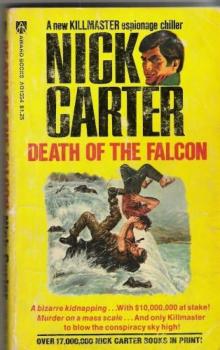 Death of the Falcon
Death of the Falcon The Executioners
The Executioners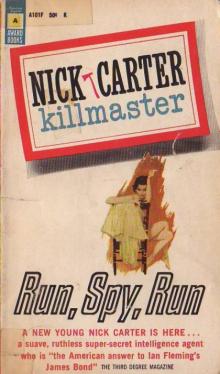 Run, Spy, Run
Run, Spy, Run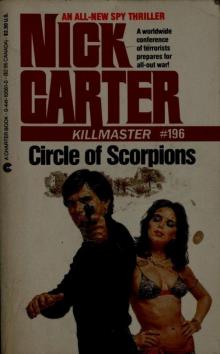 Circle of Scorpions
Circle of Scorpions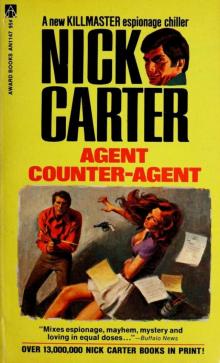 Agent Counter-Agent
Agent Counter-Agent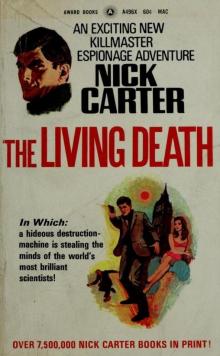 The Living Death
The Living Death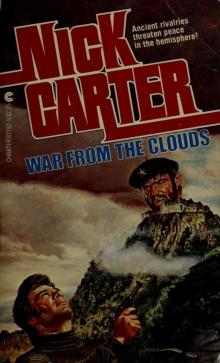 War From The Clouds
War From The Clouds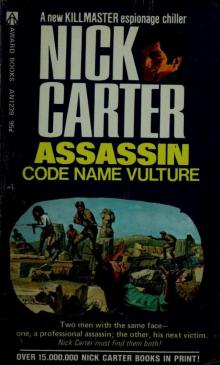 Assassin: Code Name Vulture
Assassin: Code Name Vulture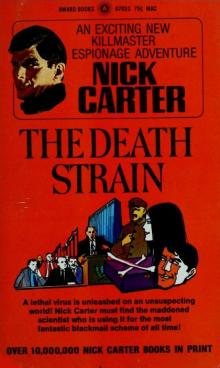 The Death Strain
The Death Strain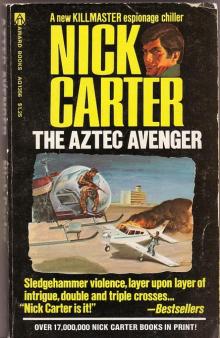 The Aztec Avenger
The Aztec Avenger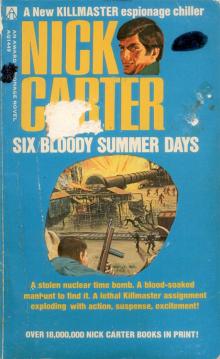 Six Bloody Summer Days
Six Bloody Summer Days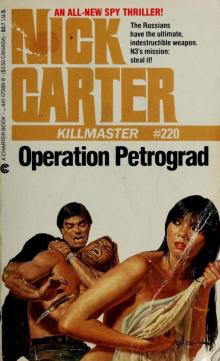 Operation Petrograd
Operation Petrograd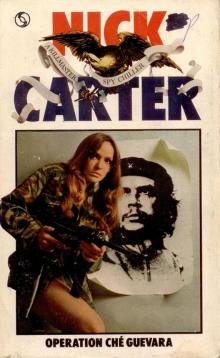 Operation Che Guevara
Operation Che Guevara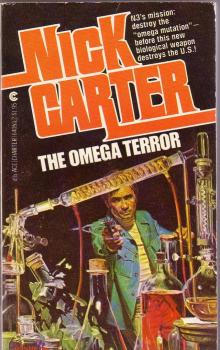 The Omega Terror
The Omega Terror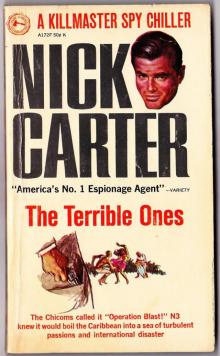 The Terrible Ones
The Terrible Ones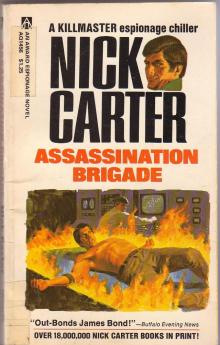 Assassination Brigade
Assassination Brigade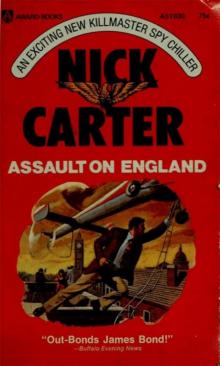 Assault on England
Assault on England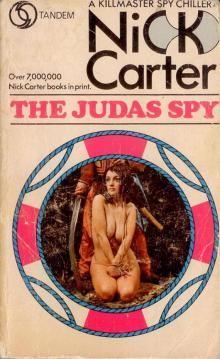 The Judas Spy
The Judas Spy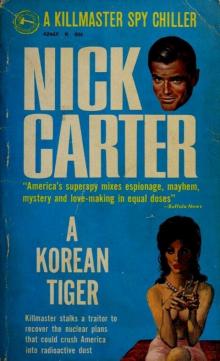 A Korean Tiger
A Korean Tiger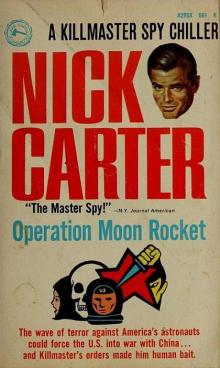 Operation Moon Rocket
Operation Moon Rocket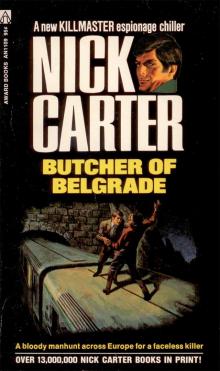 Butcher of Belgrade
Butcher of Belgrade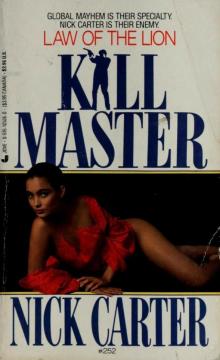 Law of the Lion
Law of the Lion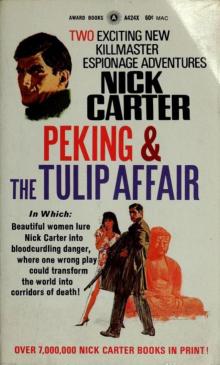 Peking & The Tulip Affair
Peking & The Tulip Affair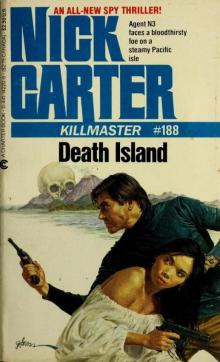 Death Island
Death Island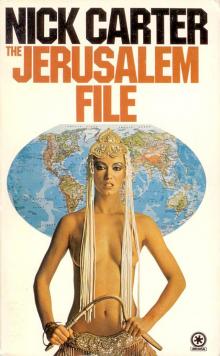 The Jerusalem File
The Jerusalem File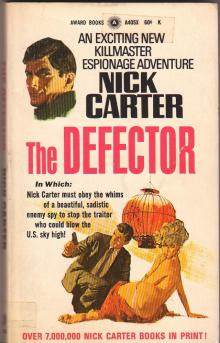 The Defector
The Defector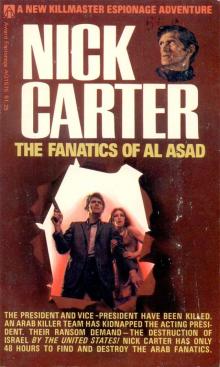 The Fanatics of Al Asad
The Fanatics of Al Asad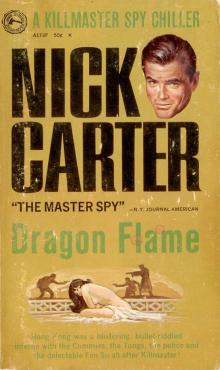 Dragon Flame
Dragon Flame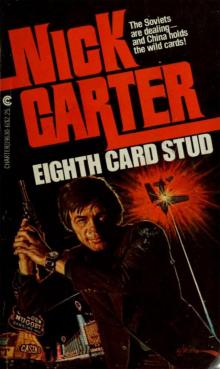 Eighth Card Stud
Eighth Card Stud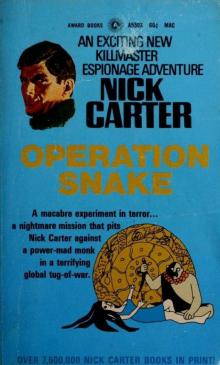 Operation Snake
Operation Snake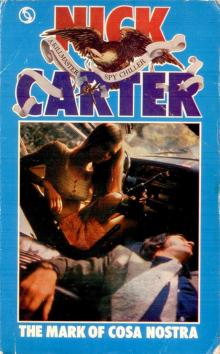 The Mark of Cosa Nostra
The Mark of Cosa Nostra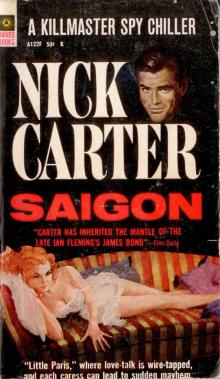 Saigon
Saigon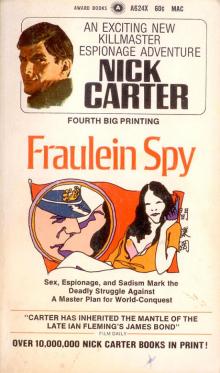 Fraulein Spy
Fraulein Spy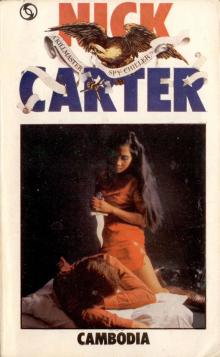 Cambodia
Cambodia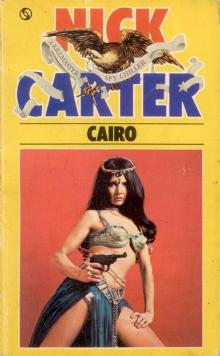 Cairo
Cairo